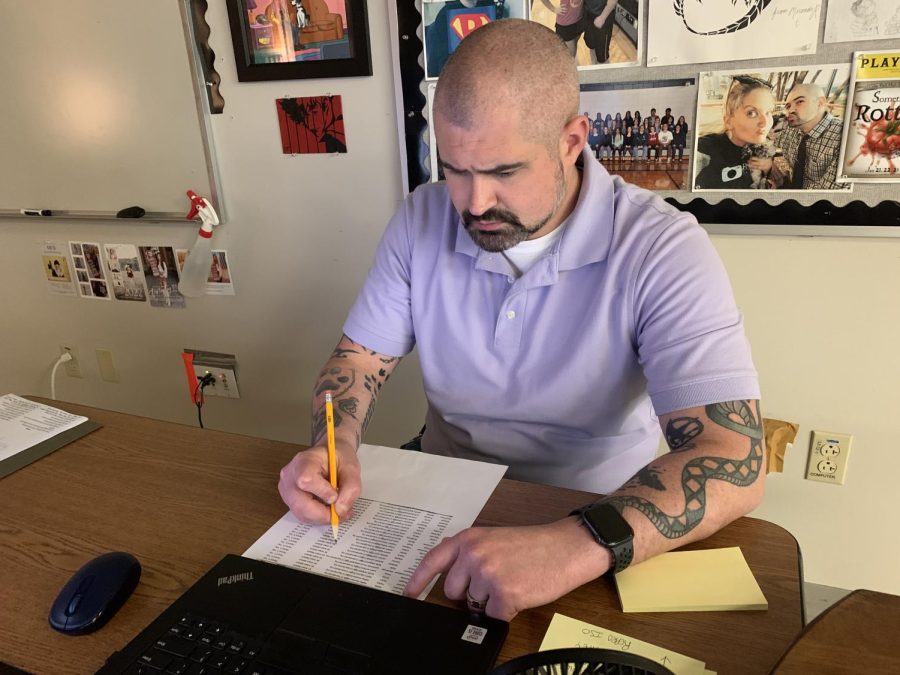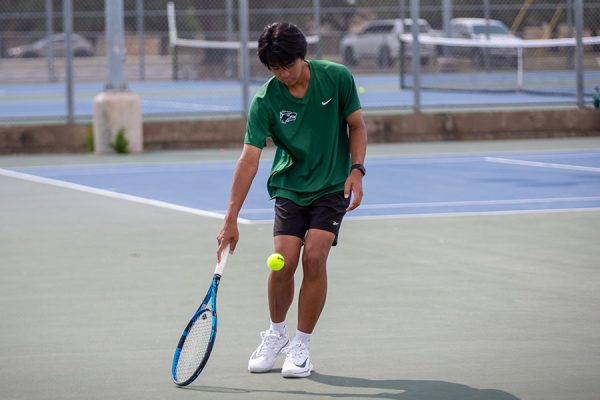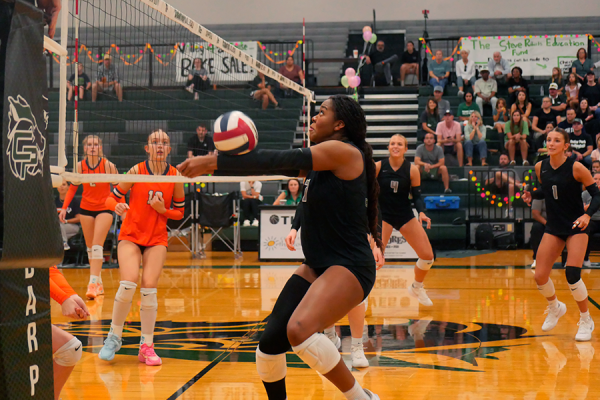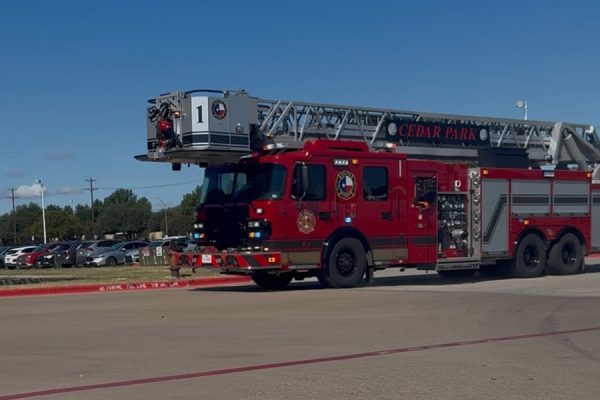The Burnout
Why Teachers Are Stressed; What’s Next
Photo Courtesy of Ruchi Sankolli
Biology and AP Biology teacher Adam Babich sits at his desk, concentrating on his paperwork. Babich is one of the teachers who have been affected by teacher burnout, and feels teachers are not heard enough when it comes to their struggles. “The most stressful part about teaching is not having your voice heard,” Babich said. “At a campus level, I would march off to war for my administration team; Mr Sloan, everybody, they’re great and they’re supportive. The problem comes from the higher ups; a lot of what we deal with, whether it is pay raise, or budget issues, or standards or state testing, we can give our voice, but really, nothing ever comes of it. These are legislative bodies that do a lot of the decision making and we know that, at a government level, things move at a snail’s pace. If an issue shows up, it often takes a very long time to see any results from it. For example, they’re putting together a task force to figure out why teachers are leaving. When we looked at the first task force, there was maybe two teachers on it; everyone else were superintendents, or people who had not been in the classroom for 10 years. So, as teachers, we felt like this was a slap in the face. I’m not saying that all teachers feel this way, I’m saying some of us do, and this is what we’re feeling. It’s like we’re in the trenches, we’re asking for help and we get decisions made for us by people who aren’t in the classrooms.”
May 16, 2022
From the pandemic to providing extra tutoring to student behavior, high school teachers nationwide have been resigning from their positions. Some say it’s the extra workload, while some just want to take a personal break from teaching. Either way, the rate of teacher resignation has increased by at least 6%, with more than 40% of teachers reporting they will be leaving in March 2021, and it’s becoming a personal issue for some teachers.
“It has been a pretty rough couple of years since COVID started,” Algebra 2 and Calculus teacher Matt Rinn said. “Many teachers have called it the most stressful years of teaching since their first year of teaching. It is very sad to see my fellow teachers having a hard time, especially because it is causing some teachers to quit the profession.”
In addition, teachers are required to do some extra work for students as well. With the pandemic being a setback already, they are required to do extra work to compensate for the pandemic’s effects. In the 87th Texas Legislative Session, a bill known as House Bill 4545 was released. This bill requires teachers to provide an extra 30 hours of tutoring for any student that failed the STAAR during the pandemic/virtual year.
“As teachers, we have our class that we teach,” Babich said. “But then we may do clubs, we have additional duties, like every Thursday, I’m supposed to stand out in the courtyard with Trueblood, just to have teacher presence there. There’s certain things that happen in the school that require all hands on deck, like when we do state testing, when we do AP testing and when we do ACT/SAT testing, because teachers have to come monitor and proctor [for the exams]. Nobody likes doing that, but we know it’s part of the job.”
Teacher Burnout is a psychological condition that can lead to several physiological and internal issues. It has causes, symptoms and cures. It is defined by Psychology Today as a chronic stress condition that leads to many effects, ranging from mental and emotional, to even physical. The website listed the most common symptoms of teaching burnout include: Fatigue and sleep issues, trouble with concentration/increased forgetfulness, appetite issues and depression and anxiety
“The biggest symptom that I have felt is a lack of concentration,” Babich said. “For me, personally, I’m coming back next year; I wrote a lesson for Bio today, I was excited to do it, it was fun. I still have the drive, I still have the fire, I’m still excited to work with students, [but] it’s the extra stuff that’s really driving me down. My biggest thing is the ability to focus because there’s so many things going on, it’s hard for me to focus on this or that. I wouldn’t say that I’m burned out, but I’m definitely limping to the finish line.”
Overworking seems to be a big factor of teacher burnout too, as a lot of teachers, especially after the House Bill passed, reported to be overworked. Environmental Systems teacher Shawntel Driver opened up about her burnout symptoms, especially when starting out.
“There were days, at the beginning of the year, when I would get [to school] at seven, and leave at six,” Driver said. “Well over my contract hours, well over 40 hours a week, and we don’t get paid overtime. When I was doing those long hours, absolutely [I felt fatigued]. I just kind of stopped putting as much energy into it, so I was able to reserve [my energy] for other things. So, I don’t feel as fatigued anymore. That also comes with knowing that I’m not going to be here next year, knowing that whatever I’m going to do tomorrow is going to be the last time I’m going to do it.”
According to Education Week, a website dedicated to sharing education-related news, teacher job satisfaction is at the lowest as of now. The article compared the results of the Merrimack College Teacher Survey from 2012 to 2022, concluding that 12% of teachers reported to be very satisfied with their jobs, a decrease from the reported 39% 10 years ago. That being said, there’s a lot of aspects of teaching that add to the stress of teaching in general, according to Driver.
“I wouldn’t say that there’s this particular part,” Driver said. “I think it’s just a lot. All of it thrown together, it’s kind of like juggling spinning plates on a stick. And they just keep adding sticks and plates, and it just feels like there’s constantly a new plate that you have to spin and hold up. So, you’re just always adding something new, whether that’s from the state, or the district. Or that could even be from a student who just really needs my attention, whether it’s academically or personally. It’s just a mix of a bunch of things all at once, and it’s all professional stuff. And then there’s also emotional stuff that gets piled on.”
The amount of stress and work is also an emotional struggle as well, according to Driver. Unexpected events occur in class that teachers struggle to prepare for and eventually deal with.
“When you have 30 kids, you never know what walks through the door,” Driver said. “And sometimes, you have to give them room to be emotional, and that can be kind of taxing as a teacher. I’m pulled in so many different directions.”
All the work and stress is causing many younger teachers to burn out early, leading to more than 44% of teachers leaving the profession itself.
“I’ve been thinking about leaving teaching for a couple of years,” Driver said. “I knew that Cedar Park would be my last; whether it was my last one, and I wasn’t gonna stay here forever, or it was my last school as a teacher. [My leaving] doesn’t have anything to do with the school, it’s not the students. I just feel like I have bigger ambitions, and I don’t have those ambitions within the school setting. I want to go and do other things that aren’t within education.”
Besides the work, the status of teachers is equally as taxing. The lack of awareness about the issues that teachers face is only adding to the amount of progress and work that needs to be done, according to Babich.
“The most stressful part about teaching is not having your voice heard,” Babich said. “At a campus level, I would march off to war for my administration team; Mr Sloan, everybody, they’re great and they’re supportive. The problem comes from the higher ups; a lot of what we deal with, whether it is pay raise, or budget issues, or standards or state testing, we can give our voice, but really, nothing ever comes of it. These are legislative bodies that do a lot of the decision making and we know that, at a government level, things move at a snail’s pace. If an issue shows up, it often takes a very long time to see any results from it. For example, they’re putting together a task force to figure out why teachers are leaving. When we looked at the first task force, there was maybe two teachers on it; everyone else were superintendents, or people who had not been in the classroom for 10 years. So, as teachers, we felt like this was a slap in the face. I’m not saying that all teachers feel this way, I’m saying some of us do, and this is what we’re feeling. It’s like we’re in the trenches, we’re asking for help and we get decisions made for us by people who aren’t in the classrooms.”
At a general level, according to Babich, changing viewpoints on education is a great way to solve this issue at hand. Babich said he feels a lack of respect for education and a shift in priorities for a lot of people when it comes to academics.
“This is a huge shift in American education,” Babich said. “You often hear students say ‘ugh, I have to go to school tomorrow,’ not ‘I get to go to school tomorrow.’ So, in other countries, education is a privilege, students want to go to school. And I get it, high school can be brutal, and school is not fun for everybody. If we want to come together to solve this problem, I think it’s how we view education, not as a burden, not as intrusive, not as indoctrination. From a societal perspective, if we started viewing education as a privilege, as something to want to do, we may be more inclined to see the problems that exist and then try to fix them.”
Rinn said that teaching has brought some rewarding experiences as well. From meeting new students to getting support from fellow teachers, the teaching experience can be an amazing experience, according to Rinn.
“I have had some AMAZING students over the past five years,” Rinn said. “I love seeing the students grow so much over the year, and I have taught so many students that I know are going to go on and do some amazing things. Students are the reason I want to be the best teacher possible. Additionally, my other teachers and the principals at CPHS are amazing, and I love to see how great they are and how much they care about their students.”



![Jumping off the ground, senior linebacker Bennett Patton snatches the ball out of the air for an interception at Thursday’s game against Chaparral. Patton had two interceptions in the 56-14 victory, tying the school record for interceptions in a game. “I was just playing the game,” Patton said. “[I’m] going to go into next week, forget about it and stay humble.” Photo by Harper Chapman](https://cphswolfpack.com/wp-content/uploads/2025/09/bennett-interception.jpg)
![The fire department came to the school after students were evacuated when smoke started coming from the ceiling of a classroom. All students and staff are safe. “All of my friends left their stuff too, so we couldn’t contact our parents, and it was stressful,” senior Brynn Fowler said. “It was scary because I didn’t know [what was going on], and I couldn’t find anyone because it was a big crowd.” Photo by Anthony Garcia](https://cphswolfpack.com/wp-content/uploads/2025/09/firetruck.jpg)


![Sitting with her friend senior Sohpia Struve at last year’s Austin City Limits Festival, senior Ava Zuniga poses for a picture under a pavilion. They are frequent attendees at ACL, an annual music festival at Zilker Park. “I would recommend seeing a bunch of people,” Zuniga said. “This past year, we camped out for Chappell [Roan] for a really long time. I think the whole point of ACL, [which] is a lot of fun, is that you can go see so many different people, even if you don’t know them. So by camping by one person, it really limits yourself from being able to go see a bunch of people.” Photo courtesy of Ava Zuniga](https://cphswolfpack.com/wp-content/uploads/2025/10/EE9E9484-FE6F-4AA0-B5F5-0C177AB32841-1200x857.jpeg)
![Broadcast, yearbook and newspaper combined for 66 Interscholastic League Press Conference awards this year. Yearbook won 43, newspaper won 14 and broadcast took home nine. “I think [the ILPC awards] are a great way to give the kids some acknowledgement for all of their hard work,” newspaper and yearbook adviser Paige Hert said. “They typically spend the year covering everyone else’s big moments, so it’s really cool for them to be celebrated so many times and in so many different ways.”](https://cphswolfpack.com/wp-content/uploads/2025/05/edited-ILPC.jpg)




![Looking down at his racket, junior Hasun Nguyen hits the green tennis ball. Hasun has played tennis since he was 9 years old, and he is on the varsity team. "I feel like it’s not really appreciated in America as much, but [tennis] is a really competitive and mentally challenging sport,” Nguyen said. “I’m really level-headed and can keep my cool during a match, and that helps me play a bit better under pressure.” Photo by Kyra Cox](https://cphswolfpack.com/wp-content/uploads/2025/09/hasun.jpg)


![Bringing her arm over her head and taking a quick breath, junior Lauren Lucas swims the final laps of the 500 freestyle at the regionals swimming competition on date. Lucas broke the school’s 18-year-old record for the 500 freestyle at regionals and again at state with a time of 4:58.63. “I’d had my eye on that 500 record since my freshman year, so I was really excited to see if I could get it at regionals or districts,” Lucas said. “ State is always a really fun experience and medaling for the first time was really great. It was a very very tight race, [so] I was a bit surprised [that I medaled]. [There were] a lot of fast girls at the meet in general, [and] it was like a dogfight back and forth, back and forth.” Photo by Kaydence Wilkinson](https://cphswolfpack.com/wp-content/uploads/2025/03/Kaydence-2.7-23-edit-2.jpg)
![As the support team sits and poses for a photo in the cafeteria with the counseling team they eagerly wait to start their day. "We [all] seem to be a team, I get up every day and there's days where I don't want to go to work today, but I'm thankful that I have a job and I'm blessed to have what I have," Christopherson said. Photo Courtesy of Julie Weltens.](https://cphswolfpack.com/wp-content/uploads/2025/01/AF9E8470-10D7-4C91-BF28-EC8F86BAB66C-1200x852.jpeg)
![Officer Stephanie Cash is in her second year as an SRO at CPHS. “Seeing [students] grow over the years has been kind of cool,” Officer Cash said. “Freshmen that [are] all over the place and then in the next couple of years get a little more squared away and go to class and do work and start thinking about the future. Being a part of a student's growth is the best way to measure my success as an SRO.” Photo Courtesy of Cedar Park Police Department's PIO, Alicia Gallagher.](https://cphswolfpack.com/wp-content/uploads/2024/12/CPHS-SRO-900x1200.jpg)
![As he sprints with the ball, senior running back Trae Hill breaks a tackle during Friday’s 35-14 loss against the Vandegrift Vipers. Hill ran for 135 yards and two touchdowns during the game. “[Scoring] was electric,” Hill said. “It always feels good to score, but the O-line did everything.”](https://cphswolfpack.com/wp-content/uploads/2025/09/IMG_0795allie.varfb_-1200x799.jpg)


























![The fire department came to the school after students were evacuated when smoke started coming from the ceiling of a classroom. All students and staff are safe. “All of my friends left their stuff too, so we couldn’t contact our parents, and it was stressful,” senior Brynn Fowler said. “It was scary because I didn’t know [what was going on], and I couldn’t find anyone because it was a big crowd.” Photo by Anthony Garcia](https://cphswolfpack.com/wp-content/uploads/2025/09/firetruck-300x200.jpg)

![Finishing her night out after attending a local concert, senior Grace Sauers smiles at the camera. She recently started a business, PrettySick, that takes photos as well as sells merch at local concert venues. Next year, she will attend Columbia Chicago College majoring in Graphic Design. “There's such a good communal scene because there [are] great venues in Austin,” Sauers said. “I'm gonna miss it in Austin, but I do know Chicago is good, it's not like I'm going to the middle of nowhere. I just have to find my footing again.” Photo Courtesy of Grace Sauers.](https://cphswolfpack.com/wp-content/uploads/2025/04/Grace-300x225.png)


